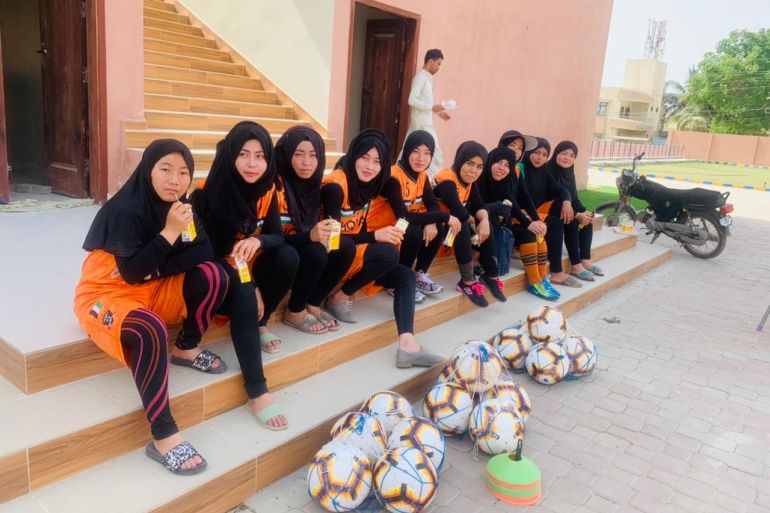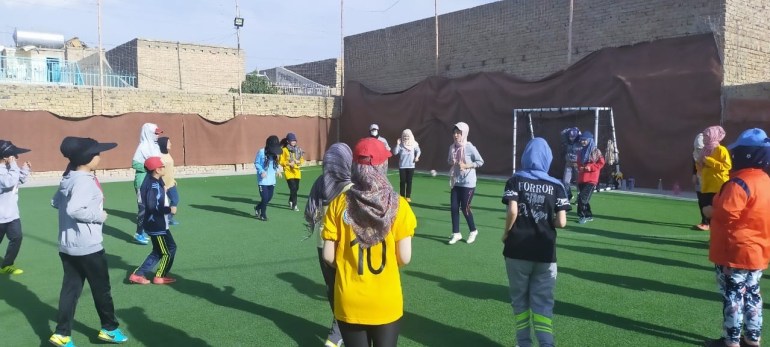How football offers solace for Hazara women battling trauma, fear
As the Hazara community in Quetta deals with discrimination and violence, the sport becomes a game-changer for young women.

Karachi, Pakistan – Sughra Rajab, 19, and Shamsia Ali, 21, were just two of the young footballers who represented the Hazara Quetta team at the National Women’s Football Championship in March this year.
The pair travelled hundreds of kilometres from Quetta, in the southwestern province of Balochistan, to the southern coastal city of Karachi.
Keep reading
list of 4 itemsIn Pictures: Football helping refugees find their feet in England
Honey Thaljieh: First captain of Palestine women’s football team
FIFA suspends Pakistan football after ‘hostile takeover’
For Ali, coming to Karachi and playing at that level was a “dream coming true”.
Rajab, meanwhile, termed it “an opportunity of a lifetime”, adding that “the exposure here is amazing and I’m really liking it”.
Playing the sport they love the most without fear and worries off the pitch seemed a welcome relief not just for the pair but the entire team.
The girls belong to the Hazara minority community in Pakistan. Most of the Hazaras live in Quetta, the capital of Pakistan’s biggest but poorest province. The Hazaras have been long persecuted for their, targeted by attacks and bombings.
Since 2005, almost 2,000 Hazaras have been killed by protracted sectarian violence against the community, according to a report published by the National Commission for Human Rights Pakistan in 2018.
Amid sectarianism, violence and fear, football has become a beacon of hope for the community, especially the girls.
Wearing black scarfs and shorts with black leggings under the scorching sun makes them uneasy and their recollection of life back in the enclave Hazara Town in Quetta remains tinted with its own set of discomfort and trauma.
“We try to move on in our daily routines, visiting friends and family, playing sports,” said Rajab. “But when the security situation gets bad, we just stay at home. Safety is our biggest concern.”
Given the safety concerns, travelling to Karachi for the tournament was not an easy decision for the players or their families.
“I lost an uncle in targeted attacks two years ago. Mentally, I feel very disturbed all the time,” Rajab said.
For Ali too, it was a struggle to convince her family.
“My father said if men from our community can’t be safe, how can we expect women to be safe,” said Ali.
But it was Saba It, the team coach, who managed to convince the parents after countless consultations and counselling for months.
“Our community is a victim of constant persecution and killings. I had to plan and start convincing the families a year in advance before the tournament,” Saba, a former footballer who represented Balochistan, said.
She added that targeted killings have deprived Hazaras of so many opportunities that a safe environment offers.
“Trauma and fear is so prevalent in whatever we do, it is ingrained in every decision we make in our lives,” she said.
Setbacks
In January this year, 11 coal miners from the Hazara community were kidnapped and killed in Machh, Balochistan, in an attack claimed by a group of ISIL (ISIS) fighters.
The community members organised a sit-in protest demanding justice. They insisted on not burying the dead until Prime Minister Imran Khan visited them.
While PM Khan, at first, termed the request blackmailing, he backed down and visited the families on January 9.
After the attack, the yearlong struggle that Saba was pursuing to convince the parents in letting the girls travel was hit hard.
“Convincing them again was just a lot of struggle once again. After the attack, some parents backed out. The girls called and cried constantly,” she said.
Initially, it was Saba’s commitment to helping out Hazara women and empowering them that prompted the young girls to take interest in football and subsequently resulted in the formation of the team.
In 2017, she set up handicrafts and a stitching workshop in Hazara Town, accommodating everyone, including young Hazara women who have lost family members in the attacks.
Spotting the colourful photographs from her playing days hanging inside the workshop, the attendees became intrigued.
“We saw Saba’s photo as a footballer and it fascinated us,” said Rajab.
Initially, Saba took informal football training. But that was not straightforward.
“We would go out before dawn so no one would see our training. We trained on an open field weekly. At that time, we couldn’t afford to get a proper football.”
Within a year, the ambitions grew. They wanted to form a proper team, play regular football and represent their community at a professional level.
With these aspirations, Saba requested permission from the Hazara Football Academy to use their ground.
Frightened setting
Initially, she was mocked. People questioned women’s participation in the sport. But persistence paved the way as they were given the approval.
“After constant requests, the academy allowed us to use their ground. We paid 15,000 Pakistani rupees [$98.5] a month and would train three times a week,” said Saba.
A 2018 report by the Human Rights Watch described the Hazara community’s living conditions in Quetta mirroring an open jail due to the violence. The frightened setting has trickled down in every generation of the Hazara experience.

Jalila Haider, a human rights activist and advocate, said for the women specifically, a “double-jeopardy exists in society”.
“They are at first marginalised because they are female. The marginalisation is doubled since they are from the Hazara community,” Haider told Al Jazeera.
“The sexist societal issues and the cycle of fear in the community subjugates the Hazara women further. They are already in trauma because they have lost their uncles, brothers or fathers. The lack of professional skills and liberation in a turbulent environment, mired by violence, leaves them traumatised.”
Saba, and many girls on the team, also remain psychologically disrupted.
“Every Hazara household has experienced bloodshed due to terrorism. The girls are always in a state of shock and worry,” said Saba. “Some players would constantly break down. Sometimes, the pressure made them faint.”
Saba holds a brave face as the coach but sometimes, being human, she would fall into depression out of fear.
“Sometimes, I do not understand what to do. I took responsibility for these young girls.”
“For the first two weeks, I cried a lot all night. There is a lot of fear for safety.”
Back in Quetta, Saba started counselling sessions for the families, aiming to take them out of the blanket of fear and allow the girls to play.
The sessions were organised with the girls’ school principal and through a systematic approach, the parents understood the important position of football in their daughter’s life, said Saba.
“I told them that these girls are disturbed and needed to go out. They need to play football and get experience outside of the confined spaces to feel better,” Saba added.
In Karachi, Ali said the change of environment gave her a confidence boost.
“I’m meeting people from outside, I’m learning so much from other players and the motivation they carry for the game. Mentally, I feel like now I want to excel more in football at all levels,” she said.
Ali Hunardost, 40, is the father of one of the players from the team. Unlike the majority of families that were reluctant to let their daughters travel and play, Hunardost was keen to have her daughter press on.
“People are scared for their lives but I think we should not live with such negativity. Progress will only come if men and women are given equal opportunities,” said the father of five.
Hunardost’s 20-year-old daughter has been playing football for two years.
“She was very quiet at school but was always good at sports so I encouraged her to start training for football. I want to support her in all her achievements. My other daughter does martial arts.”
Unpredictability
The violence and attacks on Hazaras in Balochistan have continued despite the existence of check posts and provision of security across the province. According to Haider, the situation remains unpredictable.
“We can’t predict if the situation has improved. Sometimes we feel relieved that nothing happened and all of a sudden, something happens.
“The Hazaras need to feel safe and investment in human capital is essential at all levels. We need empowerment and equal opportunities, this way we can also contribute to the economy of the country,” Haider said.
Meanwhile, Ali and Rajab yearn to pursue and play football at an international level.
“Everyone is ambitious, and so are we. I’m sure if we were able to just be in Karachi after so many hardships and lack of resources, imagine how we will excel if things are made easier.”